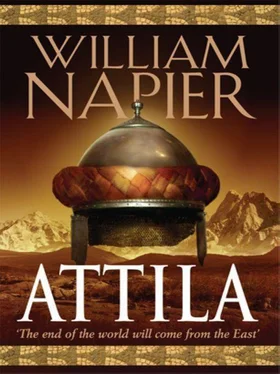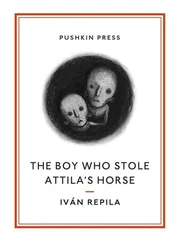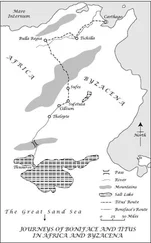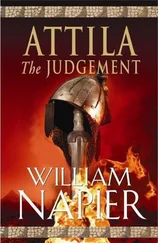William Napier - Attila
Здесь есть возможность читать онлайн «William Napier - Attila» весь текст электронной книги совершенно бесплатно (целиком полную версию без сокращений). В некоторых случаях можно слушать аудио, скачать через торрент в формате fb2 и присутствует краткое содержание. Жанр: Исторические приключения, на английском языке. Описание произведения, (предисловие) а так же отзывы посетителей доступны на портале библиотеки ЛибКат.
- Название:Attila
- Автор:
- Жанр:
- Год:неизвестен
- ISBN:нет данных
- Рейтинг книги:5 / 5. Голосов: 1
-
Избранное:Добавить в избранное
- Отзывы:
-
Ваша оценка:
- 100
- 1
- 2
- 3
- 4
- 5
Attila: краткое содержание, описание и аннотация
Предлагаем к чтению аннотацию, описание, краткое содержание или предисловие (зависит от того, что написал сам автор книги «Attila»). Если вы не нашли необходимую информацию о книге — напишите в комментариях, мы постараемся отыскать её.
Attila — читать онлайн бесплатно полную книгу (весь текст) целиком
Ниже представлен текст книги, разбитый по страницам. Система сохранения места последней прочитанной страницы, позволяет с удобством читать онлайн бесплатно книгу «Attila», без необходимости каждый раз заново искать на чём Вы остановились. Поставьте закладку, и сможете в любой момент перейти на страницу, на которой закончили чтение.
Интервал:
Закладка:
Some criminals were made to dress up as peasants, and kill each other with pitchforks. A man who had raped his young daughter was tied to a stake and Caledonian hunting dogs were set on him, to devour his genitals while he was still alive – the crowd especially appreciated that one. There was a long and bloody fight between a huge forest bison and a Spanish bear. The bison was killed eventually, but the bear had to be dragged from the arena on a travois and was no doubt despatched in the cells below. There were no longer gladiatorial combats, however, since they had been abolished for good, as unbefitting to a Christian empire. Nor were there elephants to be slaughtered, for Africa had been ransacked over four long centuries by Rome, and the vast herds that had once roamed Libya and Mauritania could be found no more. It was said that if you wanted elephants now, you had to travel south many thousands of miles over the Great Desert, and into the unknown heart of Africa; but everyone knew that that was impossible. And there were no fierce tigers left in the mountains of Armenia, no lions or leopards in the mountains of Greece, where Alexander the Great had hunted them as a boy, seven centuries before. They, too, had been trapped, caged and shipped to Rome for the games; and all were gone.
4
That night, after the Huns had departed to their temporary camp beyond the walls of the city, a great feast was held for Emperor Honorius and his glorious victory over the armies of Rhadagastus.
The vast colonnaded dining hall of the palace was filled with couches arranged round a long central spread of tables, with as many as three hundred guests in proud and self-congratulatory attendance.
The hostage children were all commanded to attend: Hegemond and Beremond, the two plump Burgundian boys; the tall, fair, quick-witted, laughing Franks; the two slothful Vandal princes, Beric and Genseric; and all the rest. Attila sat scowling in their midst, none of them daring to come too near him. Even the fierce way he handled a fruit-knife frightened them.
Nearby, to the boy’s solace, were Serena and Stilicho. But it was Count Heraclian – flatterer, charmer, true-born Roman of ancient descent, and outstanding military incompetent – who found the highest favour with the emperor, sitting much nearer to the head of the room than Stilicho. At the end of the hall, on a raised dais of rich green Egyptian marble, were two huge couches of dazzling white and gold, upholstered in purple; and on them reclined the imperial brother and sister, Galla and Honorius. Honorius ate a great deal, his sister little. Their drinking patterns exhibited much the same difference in temperament.
The food and wine were magnificent. There were oysters brought all the way from fog-bound Britain, kept cool in iced sea-water during transit, and now laid out in little osier panniers still fronded with glossy green seaweed. There were the finest garum sauces imported from Bithynia and Gades; and exquisite offerings such as honey-roast peacock, boiled thrush, camels’ trotters, and a ragout of nightingales’ brains. Many of the guests cooed with delight over these fabulous delicacies, as did the other hostage children, feeling greatly privileged to be sampling such fare. The Hun boy however, ill-mannered to the core, took one taste of the Spanish flamingoes’ brain pate on a little sliver of soft wheaten bread, and spat it out again in disgust. Even Stilicho heard the noise of his revolted hawking from where he sat, and, turning round, saw what had happened. He turned back quickly, stifling a grin.
There were dolphin fishballs, boar boiled in sea-water, squid sausages, and those greatest of culinary rarities, deer’s-milk cheese, hare’s-milk cheese, and even rabbit’s-milk cheese; which, no doubt in the interest of several guests later that night, was said to be beneficial in counteracting diarrhoea.
There were red-mullet roes on beds of nasturtium leaves, and rams’ testicles, and moray eels in fermented anchovy sauce; there was ewe’s-placenta-and-simnel cake, jellyfish omelettes, and slivers of smoked crane, from birds which had been blinded early in life so that they would grow all the fatter. There were sows’ nipples in tuna brine, and auroch’s penis in a pepper and mulberry sauce. There were roast geese that had been force-fed figs for the last three months of their lives, and there was a rich pate made from the liver of a pig that had been drowned in red wine. And the wines themselves! There was Pucinum, from the Tergestine Gulf, and sweet Marino, from the Alban Hills. There was a rich ruby Chian (dangerously heady), a twelve-year-old Numentian, and even a Falernian, of the world-renowned Opimian vintage, as the label on the neck testified: almost one hundred years old, and, to everyone’s agreement, only now reaching its best.
‘Sir?’ asked a slave, extending a bottle towards Stilicho.
The general shook his head. ‘Water.’
The imperial cooks, all one thousand of them, had excelled themselves in hard work and ingenuity. True to the Roman fashion, they had taken immense pains to disguise one kind of food amusingly as another. How the guests’ laughter tinkled to the gilt-and-painted ceiling, when they realised that what they had taken to be a pigeon, roasted and glazed with honey, was in fact made entirely out of sugar. And what exquisite imagination had gone into creating that boiled hare, which had then had its fur sewn back on, and kestrels’ wings attached to its back, so that it looked like some kind of strange miniature Pegasus!
The whole thing was an absolute triumph of Roman taste and creativity, and the magnificence of the banquet was greeted with almost universal acclamation. The guests ate and drank with gusto, and retired frequently to void their bladders, their stomachs, or both.
There was the usual dinner-party conversation: about the dreadful hot weather they’d been having recently, and how they longed to get out to their little place in the country, just as soon as the triumph was over. The quality of life was so much better in the hills of Campania this time of year, and so much nicer for the children, too. And the impoverished country people could be quite charming, in their funny, uneducated attitudes and opinions.
The guests paused to take another frog’s leg or two from the silver dish before them, to crease up their faces and break wind, or to cleanse their fingers in golden bowls scented with rose petals, and dry them on the hair of a passing slave.
One could still pick up a very nice little villa, with a few acres of vines and olive trees, for really very little. They had heard good things about the area around Beneventum, for instance, that lovely old colonial town on the Via Appia, beyond Capua. A little remote and primitive, it was true, and not as easy to get to as Capua; but nevertheless charming, simply charming. Capua had been rather ‘discovered’ nowadays, and was suffering from what they called ‘Neapolitan overspill’, whereas further up into the hills, around Caudium and Beneventum, one still felt one was in the real Italy. The Via Appia was not as well-maintained as in the past, of course – they lowered their voices a little here – and one tended to arrive rather travel-sore. And one couldn’t get fresh oysters for one’s dinner parties in the local shops there for love nor money. One rather had to ‘make do’ with what local produce was on offer, which could sometimes be somewhat rough and ready: barley bread, horsemeat sausages, figs, that sort of thing. But all the same, a few weeks in the hills of Campania, at one’s little villa, could be such a relief from Rome. One did need it, really.
Then they talked about the ridiculous property prices in the city: now even apartments on the Aventine were sought after. Soon people would be claiming that it was fashionable to live west of the river! And there were grumbles about economic migrants from the north, especially Germans, and how they had no manners, no sense of law and order, and lowered the tone of an entire neighbourhood when they moved in. They wore ridiculous trousers, had too many children, and smelt funny.
Читать дальшеИнтервал:
Закладка:
Похожие книги на «Attila»
Представляем Вашему вниманию похожие книги на «Attila» списком для выбора. Мы отобрали схожую по названию и смыслу литературу в надежде предоставить читателям больше вариантов отыскать новые, интересные, ещё непрочитанные произведения.
Обсуждение, отзывы о книге «Attila» и просто собственные мнения читателей. Оставьте ваши комментарии, напишите, что Вы думаете о произведении, его смысле или главных героях. Укажите что конкретно понравилось, а что нет, и почему Вы так считаете.












